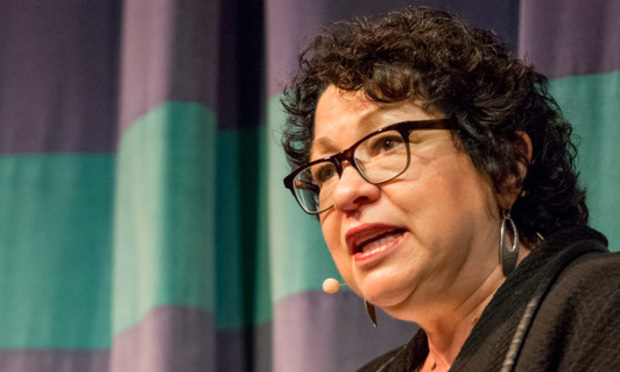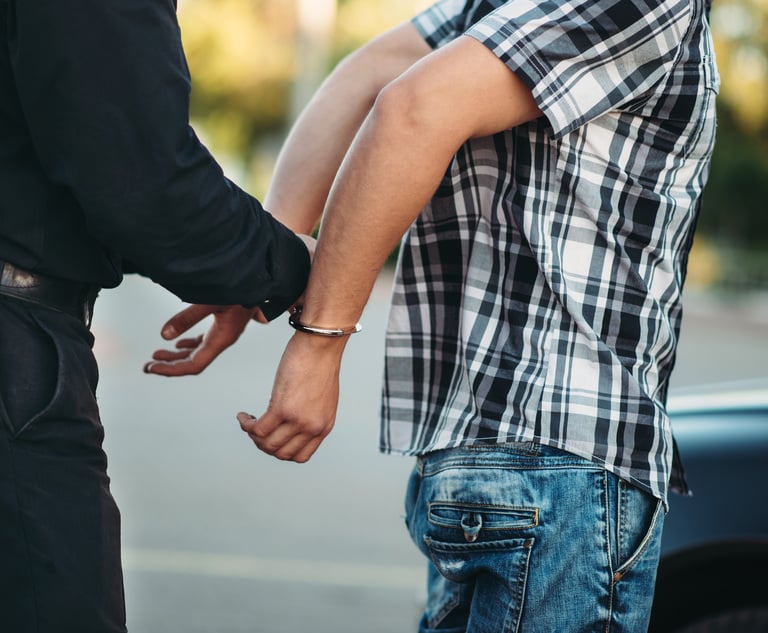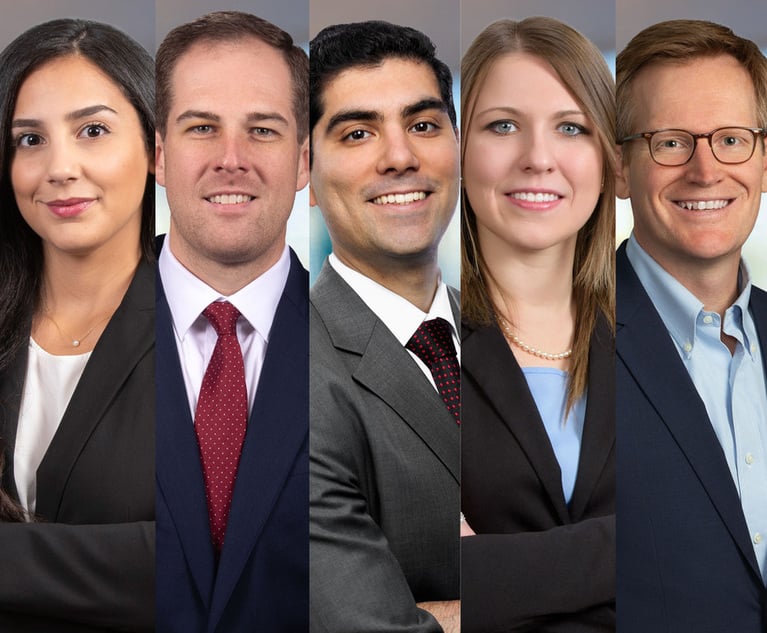Sotomayor on Kavanaugh Controversy: 'We Are Going to Let These Times Pass'
Sotomayor, in her interview with Univision, also said Puerto Rico has not received the help the island needs to recover in the aftermath of Hurricane Maria. "The richness of the island is its beauty, which we have to work to rebuild again, but we need a lot of help to do it," she said.
October 18, 2018 at 02:28 PM
4 minute read
The original version of this story was published on National Law Journal
 Justice Sonia Sotomayor. Credit: Jason Doiy/ ALM
Justice Sonia Sotomayor. Credit: Jason Doiy/ ALM
Like many Connecticut residents, U.S. Supreme Court Justice Sonia Sotomayor has family members whose lives have been rocked by weather-related losses in Puerto Rico. So the tempest of controversy surrounding the nomination of the court's newest associate justice, Brett Kavanaugh, has been, in context, a less painful experience.
Sotomayor said Brett Kavanaugh has been greeted with the traditional “welcoming for a new member of our court,” adding that members of the court “are going to let these times pass,” an apparent reference to his stormy confirmation process.
The interview with Univision was part of Sotomayor's publicity for “Turning Pages,” her newly published children's book highlighting her childhood love of reading. Born in New York of Puerto Rican parents, Sotomayor spoke Spanish in the conversation with anchor Ilia Calderón.
“Among colleagues, there is always a welcoming for a new member of our court. We need to work with him, and we are going start our new family, and work together,” Sotomayor said of Kavanaugh. “We are going to let these times pass.”
Recalling the difficulties of her own beginning at the Supreme Court in 2009, Sotomayor said it was “very complicated. The biggest difficulty after being a judge on two previous courts, arriving at the Supreme Court, the expectation of others that because I was Latina I lacked the intelligence to do this job. During the confirmation period there were a lot of people that said as much. There are a lot of them who have since changed their mind.”
Sotomayor joined the Supreme Court from the U.S. Court of Appeals for the Second Circuit, where she had served since 1998. She was confirmed 68-31 in 2009, and became the Supreme Court's first Hispanic justice.
Asked about the government's response to the damage done in Puerto Rico by Hurricane Maria last year, Sotomayor said that as a justice she is not supposed to “speak on politics, but that question I will answer: no.” She added, “Puerto Rico still needs a lot of help. The richness of the island is its beauty, which we have to work to rebuild again, but we need a lot of help to do it, and it is not being received. I feel this deeply.”
The U.S. response to Maria's devastation has become a political flash point, with critics of the Trump administration saying the government did not do enough on the preparation and response fronts. The deaths of nearly 3,000 residents have been attributed to the storm, which hit the U.S. territory in September 2017. President Donald Trump has disputed the scope of the death toll.
Sotomayor said last month that one of her relatives—the uncle of a cousin—was on a ventilator when the island lost power. Sotomayor said the relative was “struggling to breathe for eight days.”
“Regrettably, I wasn't quite accepting of the 64 person number because, not just my family, but many, many families in Puerto Rico experienced losses attributable to that storm,” Sotomayor said.
Calderón, the Univision reporter, also asked Sotomayor about feminism and whether women who are working mothers will always have to “do it all.” Sotomayor replied: “Forever. This entire life. Many young women ask me, is it possible to do everything, and I say yes, but not all at the same time. There are sacrifices that need to be made, there are moments when they can't be with their children, others when they can't be at work. One needs to accept that compromise is part of life.”
Read more:
John Roberts Talks Kavanaugh, the Court's Shrinking Docket and 'Legally Blonde'
Justice Kavanaugh May Find Rough Start With New Colleagues
Ethics Allegations Against Brett Kavanaugh Face Hurdles
John Roberts Sees Himself as 'Honest Broker' Among the Justices
This content has been archived. It is available through our partners, LexisNexis® and Bloomberg Law.
To view this content, please continue to their sites.
Not a Lexis Subscriber?
Subscribe Now
Not a Bloomberg Law Subscriber?
Subscribe Now
NOT FOR REPRINT
© 2025 ALM Global, LLC, All Rights Reserved. Request academic re-use from www.copyright.com. All other uses, submit a request to [email protected]. For more information visit Asset & Logo Licensing.
You Might Like
View All
'They Are Never Going to Learn': Geico Not Protected by Litigation Privilege
3 minute read
K&L Gates Files String of Suits Against Electronics Manufacturer's Competitors, Brightness Misrepresentations
3 minute read
Eleven Attorneys General Say No to 'Unconstitutional' Hijacking of State, Local Law Enforcement
3 minute readTrending Stories
- 1We the People?
- 2New York-Based Skadden Team Joins White & Case Group in Mexico City for Citigroup Demerger
- 3No Two Wildfires Alike: Lawyers Take Different Legal Strategies in California
- 4Poop-Themed Dog Toy OK as Parody, but Still Tarnished Jack Daniel’s Brand, Court Says
- 5Meet the New President of NY's Association of Trial Court Jurists
Who Got The Work
J. Brugh Lower of Gibbons has entered an appearance for industrial equipment supplier Devco Corporation in a pending trademark infringement lawsuit. The suit, accusing the defendant of selling knock-off Graco products, was filed Dec. 18 in New Jersey District Court by Rivkin Radler on behalf of Graco Inc. and Graco Minnesota. The case, assigned to U.S. District Judge Zahid N. Quraishi, is 3:24-cv-11294, Graco Inc. et al v. Devco Corporation.
Who Got The Work
Rebecca Maller-Stein and Kent A. Yalowitz of Arnold & Porter Kaye Scholer have entered their appearances for Hanaco Venture Capital and its executives, Lior Prosor and David Frankel, in a pending securities lawsuit. The action, filed on Dec. 24 in New York Southern District Court by Zell, Aron & Co. on behalf of Goldeneye Advisors, accuses the defendants of negligently and fraudulently managing the plaintiff's $1 million investment. The case, assigned to U.S. District Judge Vernon S. Broderick, is 1:24-cv-09918, Goldeneye Advisors, LLC v. Hanaco Venture Capital, Ltd. et al.
Who Got The Work
Attorneys from A&O Shearman has stepped in as defense counsel for Toronto-Dominion Bank and other defendants in a pending securities class action. The suit, filed Dec. 11 in New York Southern District Court by Bleichmar Fonti & Auld, accuses the defendants of concealing the bank's 'pervasive' deficiencies in regards to its compliance with the Bank Secrecy Act and the quality of its anti-money laundering controls. The case, assigned to U.S. District Judge Arun Subramanian, is 1:24-cv-09445, Gonzalez v. The Toronto-Dominion Bank et al.
Who Got The Work
Crown Castle International, a Pennsylvania company providing shared communications infrastructure, has turned to Luke D. Wolf of Gordon Rees Scully Mansukhani to fend off a pending breach-of-contract lawsuit. The court action, filed Nov. 25 in Michigan Eastern District Court by Hooper Hathaway PC on behalf of The Town Residences LLC, accuses Crown Castle of failing to transfer approximately $30,000 in utility payments from T-Mobile in breach of a roof-top lease and assignment agreement. The case, assigned to U.S. District Judge Susan K. Declercq, is 2:24-cv-13131, The Town Residences LLC v. T-Mobile US, Inc. et al.
Who Got The Work
Wilfred P. Coronato and Daniel M. Schwartz of McCarter & English have stepped in as defense counsel to Electrolux Home Products Inc. in a pending product liability lawsuit. The court action, filed Nov. 26 in New York Eastern District Court by Poulos Lopiccolo PC and Nagel Rice LLP on behalf of David Stern, alleges that the defendant's refrigerators’ drawers and shelving repeatedly break and fall apart within months after purchase. The case, assigned to U.S. District Judge Joan M. Azrack, is 2:24-cv-08204, Stern v. Electrolux Home Products, Inc.
Featured Firms
Law Offices of Gary Martin Hays & Associates, P.C.
(470) 294-1674
Law Offices of Mark E. Salomone
(857) 444-6468
Smith & Hassler
(713) 739-1250











